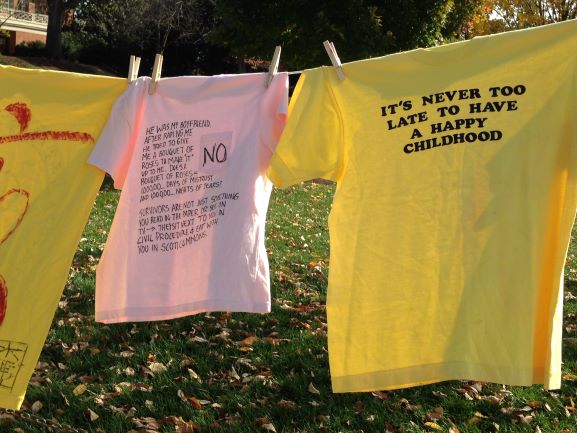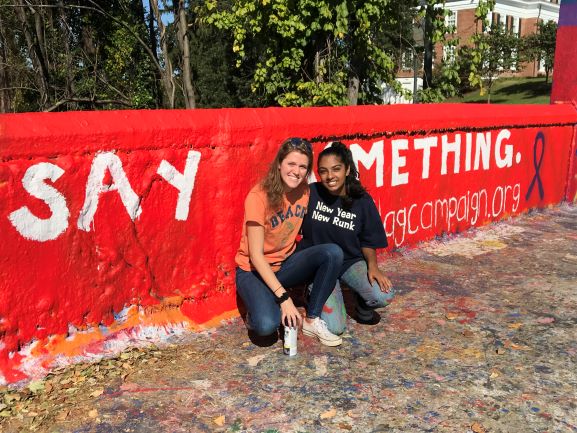Gender Violence and Social Change
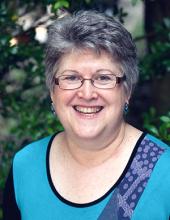 October is Domestic Violence Awareness Month, and a new group of interns at UVA’s Maxine Platzer Lynn Women’s Center is off and running with autumn activities on Grounds. In her article below, Claire Kaplan gives an encouraging nod to the young women who bring awareness to the UVA community and who believe that their work will make a better world. Ms. Kaplan is Program Director, Gender Violence & Social Change; Confidential Advocate; and Founder and Manager, SAPC list at the University of Virginia Women’s Center.
October is Domestic Violence Awareness Month, and a new group of interns at UVA’s Maxine Platzer Lynn Women’s Center is off and running with autumn activities on Grounds. In her article below, Claire Kaplan gives an encouraging nod to the young women who bring awareness to the UVA community and who believe that their work will make a better world. Ms. Kaplan is Program Director, Gender Violence & Social Change; Confidential Advocate; and Founder and Manager, SAPC list at the University of Virginia Women’s Center.
We welcome your thoughts below.
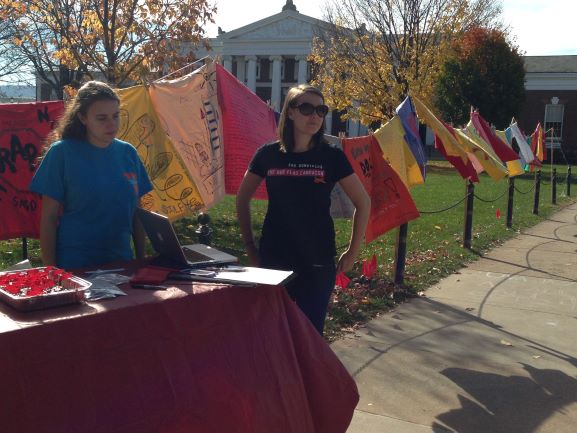 Each August as our students arrive on Grounds bringing renewed energy and excitement, the Women’s Center staff gears up to welcome a new group of interns who will work with us for the academic year. In my program, Gender Violence and Social Change (GVSC), we immediately must dive into fall planning because October is Domestic Violence Awareness Month. Our activities include hosting panel discussions and speakers, offering training workshops for students and employees, and running awareness campaigns.
Each August as our students arrive on Grounds bringing renewed energy and excitement, the Women’s Center staff gears up to welcome a new group of interns who will work with us for the academic year. In my program, Gender Violence and Social Change (GVSC), we immediately must dive into fall planning because October is Domestic Violence Awareness Month. Our activities include hosting panel discussions and speakers, offering training workshops for students and employees, and running awareness campaigns.
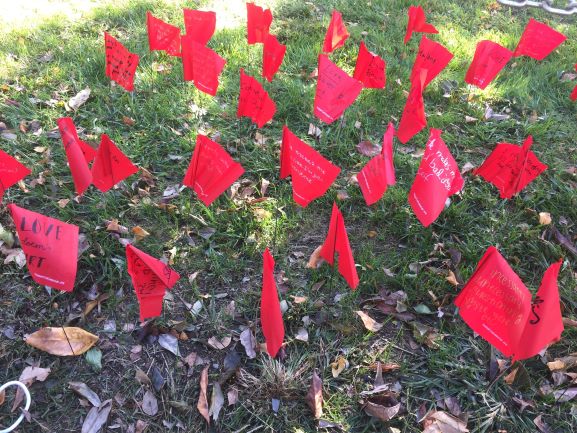 The GVSC interns love “tabling” on the lower Lawn near the Homer statue, a tradition that allows them to interact with passersby, share information, and encourage visitors to learn more about intimate partner violence. Behind the table, little red flags, part of The Red Flag Campaign bystander awareness project, dot the grass. Visitors to the table are invited to write messages on blank flags and then plant them in the grass. Some leave messages of encouragement. Others describe signs of abuse as a warning to readers. The flags remain there for two days. We then we collect them and store them for next year. We have participated in The Red Flag Campaign since its inception and have accumulated hundreds of messages. We never throw any away; they go back out on the lawn or are inserted in small flower arrangements that we deliver around Grounds to departments and programs. We also distribute educational posters to resident staff. These posters describe both healthy and unhealthy behaviors in relationships with suggested strategies for intervening when your friend describes “red flags.”
The GVSC interns love “tabling” on the lower Lawn near the Homer statue, a tradition that allows them to interact with passersby, share information, and encourage visitors to learn more about intimate partner violence. Behind the table, little red flags, part of The Red Flag Campaign bystander awareness project, dot the grass. Visitors to the table are invited to write messages on blank flags and then plant them in the grass. Some leave messages of encouragement. Others describe signs of abuse as a warning to readers. The flags remain there for two days. We then we collect them and store them for next year. We have participated in The Red Flag Campaign since its inception and have accumulated hundreds of messages. We never throw any away; they go back out on the lawn or are inserted in small flower arrangements that we deliver around Grounds to departments and programs. We also distribute educational posters to resident staff. These posters describe both healthy and unhealthy behaviors in relationships with suggested strategies for intervening when your friend describes “red flags.”
Visit us during our upcoming awareness days for this year (October 16-17, 10 a.m. – 2 p.m.) and you will also see the UVA Clothesline Project. The Clothesline Project originated in the early 1990s on Cape Cod and spread across the U.S. as community-based displays of t-shirts decorated by survivors of intimate partner violence, sexual assault, stalking, and anti-lesbian violence. Families of murder victims may also contribute shirts. Not long after I arrived at UVA in 1991, we started a project here, joining forces with Shelter for Help in Emergency and Sexual Assault Resource Agency. Each October during our days of tabling and sometimes in April during Take Back the Night, we hang our “laundry” of colorful shirts, contributed by students, staff and faculty, on the lower lawn near the Homer statue. Passersby on their way to class stop to read the messages on the shirts. Slowly realization dawns as they begin to understand.
“Even my dog understands the word NO! Why don’t you?” one shirt demands, in black letters on a red background. “It’s never too late to have a happy childhood,” says another, in plain letters on a plain yellow shirt. “I am a fighter. I am a survivor!” declares another triumphantly. Amidst the colorful shirts is the most heartbreaking contribution: a tiny onesie with meticulous calligraphy in gold that describes the terror of child sexual abuse. The openings for the baby’s hands are sewn together, graphically depicting an inability to defend oneself.
These works of art reveal grief, rage, and confusion as well as fierce pride, courage, and even moments of joy that can come with healing. Interns and volunteers from peer education groups stand by proudly to explain the purpose of the display and to support anyone who finds the messages upsetting. The Clothesline Project never fails to awaken viewers out of their between-class fog and to snap them out of complacency.
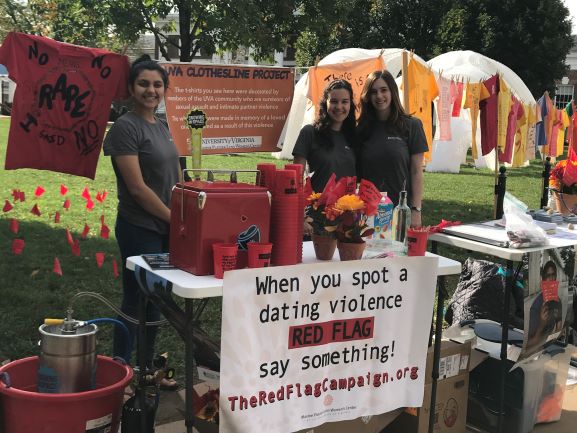 All of this happens just in the first two months of the fall semester! But it doesn’t end there: during the remainder of the academic year GVSC interns facilitate Survivor Support Network workshops to train their peers about trauma and how to support survivors; organize events on stalking, sexual assault, and others forms of violence; develop culturally relevant workshops for marginalized communities; and serve as active members of the Take Back the Night Committee. They also have the option of doing a project of their own.
All of this happens just in the first two months of the fall semester! But it doesn’t end there: during the remainder of the academic year GVSC interns facilitate Survivor Support Network workshops to train their peers about trauma and how to support survivors; organize events on stalking, sexual assault, and others forms of violence; develop culturally relevant workshops for marginalized communities; and serve as active members of the Take Back the Night Committee. They also have the option of doing a project of their own.
GVSC interns want their academic work to have meaning beyond the classroom. Many continue their activism as policy experts, psychologists, doctors, lawyers, teachers, and parents. It is a joy to watch them grow in their confidence as they discover strengths and abilities that they don’t even know they possess. They all make me proud. When people ask me how can I do this work for so long, given the distress, sadness, and trauma that survivors face and the seemingly insurmountable challenge of ending this violence once and for all, I say this: what keeps me going and gives me hope is the young people—their fierce courage, their insistence on holding us accountable, and their belief that it is possible to make this a better world.
- UVA Club of Middle Tennessee: Hoo-liday Party
- UVA Club of Culpeper: Hoo-liday Party
- UVA Club of Northern New Jersey: UVA vs Louisville Men's Hoops Game Watch
